Olivia Munn’s ‘Terrifying’ Breast Cancer Diagnosis After Baby Joy: 4 Surgeries in 10 Months, and Medically Induced Menopause (Exclusive)
Munn opens up to PEOPLE about her double mastectomy, leaning on partner John Mulaney during her recovery, and what she wants women to know about preventing breast cancer
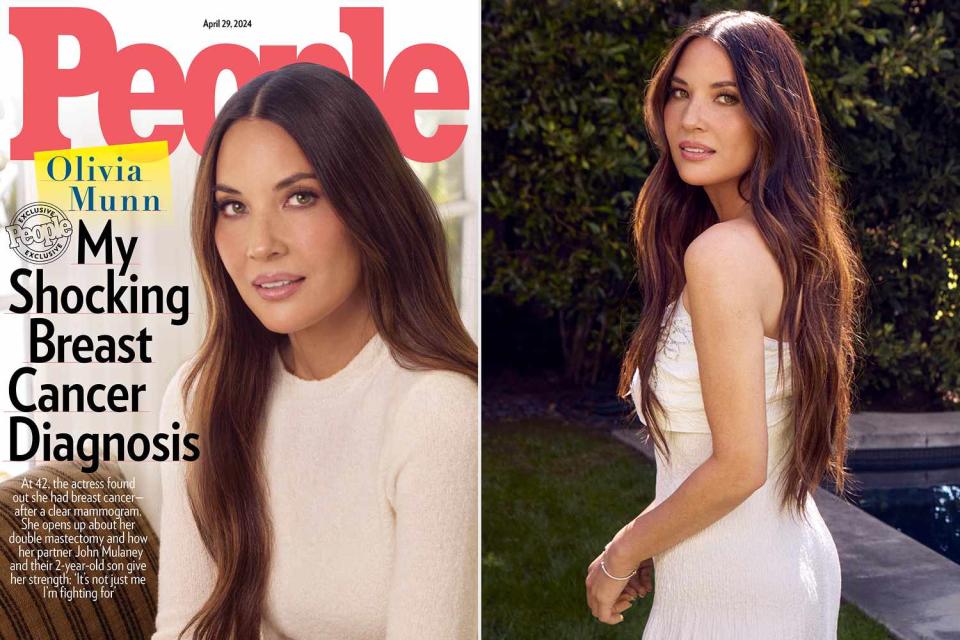
Olivia Munn does not cry easily. But recalling her breast cancer diagnosis a year ago, which ultimately led to four surgeries, a double mastectomy and medically induced menopause, tears threaten. She takes a steadying breath.
At the time, her mind went straight to her son Malcolm, then 1, with partner John Mulaney. “I was not someone who obsessed over death or was afraid of it in any way,” she tells PEOPLE in this week’s cover story. But “having a little baby at home made everything much more terrifying.”
Malcolm is now two years old, and the curious toddler arrives at the PEOPLE photo shoot post afternoon nap, by way of his father’s hip. "You look beautiful," says Mulaney, leaning down to give Munn a kiss as "Malcie" spots a blue plastic ball waiting for him on the balcony nearby.
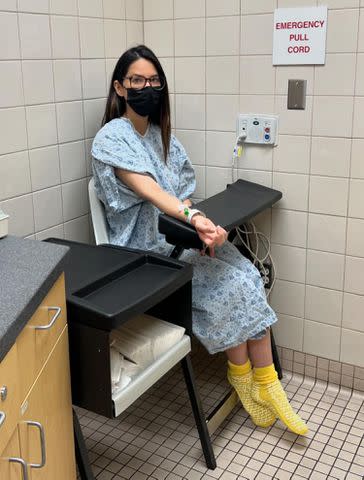
Olivia Munn/Instagram
Munn learned she had cancer in May 2023. "Cancer is very good at hiding," says the actress (getting ready for a scan in May 2023).The actress was diagnosed with bilateral breast cancer after tests revealed she had luminal B—a fast-moving, aggressive cancer—in both breasts. She was two weeks away from starting a new sci-fi film in Germany when she was diagnosed. “You realize cancer doesn’t care who you are; it doesn’t care if you have a baby or if you don’t have time,” she says. “It comes at you, and you have no choice but to face it head-on.”
Within 30 days, Munn underwent a lymph node dissection, a nipple delay procedure (a surgical procedure which spares the nipples) and a double mastectomy. “I had amazing doctors, but it was still a negotiation sometimes on what we are doing,” she says, recalling being told that she could opt for the nipple delay—but didn’t have to. “But I'm glad I did. I want to give myself the best shot of keeping the parts of me that I can keep.”
Munn's diagnosis came as even more of a shock to her because her annual mammogram just three months prior had come back clear, and she had recently tested negative for the BRCA cancer gene. “I was walking around thinking that I had no breast cancer,” she says. “I did all the tests that I knew about.”
Related: Olivia Munn's 2-Year-Old Son Malcolm Gives Her a Sweet Kiss in Adorable New Video: 'Magical Boy'
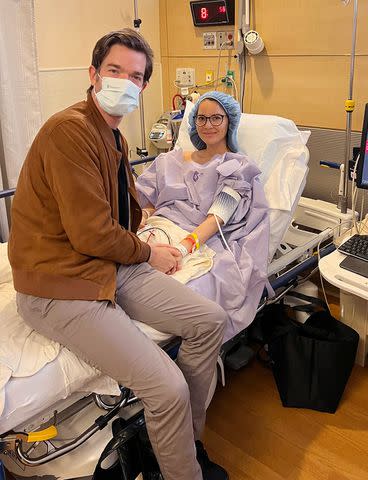
Courtesy Olivia Munn
Munn had Mulaney at her side on the day of her double mastectomy in May 2023.For more of Munn's exclusive interview, pick up this week's issue on PEOPLE on newsstands Friday.
While four out of five types of breast cancer are discovered through mammograms, an estimated 20 percent of breast cancers, like Munn’s, go undetected, according to the National Cancer Institute. During the actress’s appointment for her annual Pap smear in March 2023, Munn’s ob-gyn Dr. Thaïs Aliabadi, who co-hosts the SHE MD podcast on women’s health, asked if she knew her lifetime breast cancer risk score. Munn did not. In minutes, using a free online tool called a Tyrer-Cuzick risk assessment calculator, Aliabadi calculated Munn’s score based on various factors, including her age at her first period and her family’s history of breast cancer.
Anything above a 20 percent score is considered high-risk, signaling that additional screening beyond a standard mammogram is likely necessary. Munn’s score was an alarming 37.3 percent. Aliabadi ordered an MRI, which revealed a spot in Munn’s right breast, “just a hairline away from my lymph nodes,” the actress recalls. A subsequent ultrasound detected two more tumors in her right breast, which biopsies confirmed to be stage 1 invasive cancer. Further review of Munn's original MRI led to a biopsy which confirmed cancer in the left breast as well.
Munn’s medical team recommended a double mastectomy to remove all of the known cancer—as well as greatly reduce any further risk. “There’s so much information, and you’re making these huge decisions for the rest of your life,” says Munn. “I really tried to be prepared, but the truth is that nothing could prepare me for what I would feel like, what it would look like and how I would handle it emotionally. It was a lot tougher than I expected.”
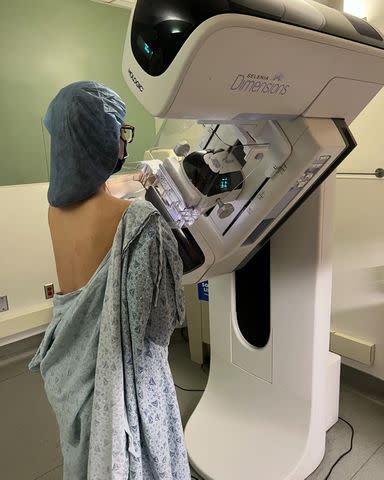
Olivia Munn/Instagram
Munn getting a follow-up mammogram before her mastectomy.Munn awoke from her double mastectomy with her chest bandaged, expanders where her breasts had been and—at eye level—a framed photo of Malcolm that Mulaney, 41, had placed at her bedside. During surgery, doctors had also discovered a “tangerine-sized” section of ductal carcinoma in situ, a preinvasive cancer, in her right breast. “Hearing that news gave me peace that I’d made the right decision,” says Munn.
After her double mastectomy, Munn decided to wait until early fall for her reconstructive surgery so she could rest and let her body recover. She continued to keep the reality of what she was going through off public platforms like Instagram. “Keeping it private for as long as I did allowed me time to fight without any outside noise at all,” she says.
When it came time for reconstruction, “I know a lot of women want to go bigger, but [I said] go smaller,” says Munn, recalling her frank discussion with her doctors. “It’s so important to say what you want out loud—and don’t stop. Even as the anesthesia was making its way into my body, the last thing I said was ‘Please go smaller.’ ”
Munn’s treatment hasn’t thus far included chemotherapy or radiation, but in November she began hormone suppression therapy to mitigate future risk, which has put her into medically induced menopause. Symptoms have followed. “I’m constantly thinking it’s hot, my hair is thinning, and I’m tired a lot,” she says.
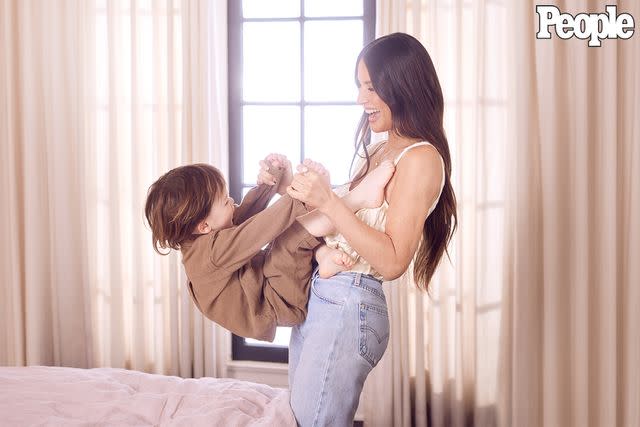
Through it all, Mulaney has been by her side. “It would’ve felt like climbing an iceberg without him,” says Munn. “I don’t think he had a moment to himself, between being an incredibly hands-on father and going to and from the hospital—taking Malcolm to the park, putting him to nap, driving to Cedars-Sinai, hanging out with me, going home, putting Malcolm to bed, coming back to me. And he did it all happily.”
Today she’s determined to raise awareness for other women at risk, crediting her ob-gyn's decision to calculate her lifetime cancer risk as the one that saved her life.
“I feel grateful that I was given the opportunity to fight,” says Munn. Throughout the last year, she adds, her son has kept her joyful.
“When I’m with him, it’s the only time my brain doesn’t think about being sick. I’m just so happy with him. And it puts a lot of stuff into perspective. Because if my body changes, I’m still his mom. If I have hot flashes, I’m still his mom. If I lose my hair, I’m still his mom. That’s really what matters the most to me. I get to be here for him.”
For more of Munn's exclusive interview, pick up this week's issue on PEOPLE on newsstands Friday.
For more People news, make sure to sign up for our newsletter!
Read the original article on People.


